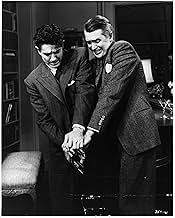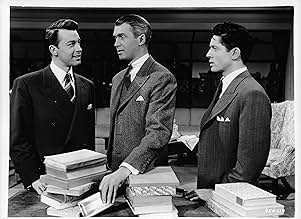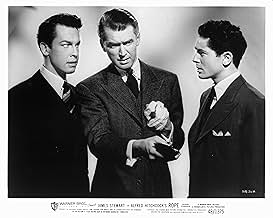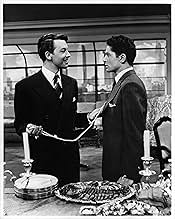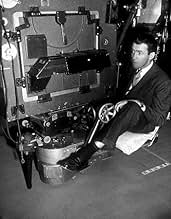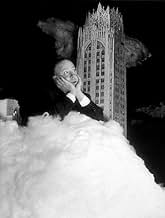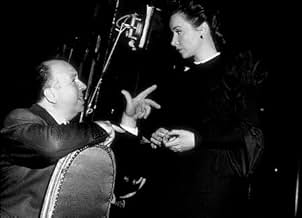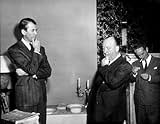Due uomini tentano di dimostrare di aver commesso il crimine perfetto organizzando una cena dopo aver strangolato a morte il loro ex compagno di classe.Due uomini tentano di dimostrare di aver commesso il crimine perfetto organizzando una cena dopo aver strangolato a morte il loro ex compagno di classe.Due uomini tentano di dimostrare di aver commesso il crimine perfetto organizzando una cena dopo aver strangolato a morte il loro ex compagno di classe.
- Regia
- Sceneggiatura
- Star
- Premi
- 4 vittorie e 3 candidature totali
Cedric Hardwicke
- Mr. Kentley
- (as Sir Cedric Hardwicke)
Alfred Hitchcock
- Man Walking in Street After Opening Credits
- (non citato nei titoli originali)
Peggy Robertson
- Woman Walking on Sidewalk
- (non citato nei titoli originali)
Recensioni in evidenza
No need to recap the plot.
Leave it to Hitch to venture into uncharted Hollywood territory. First, the movie's a "real time" screenplay that blends 80-mintes of character time into 80-minutes of screen time without a noticeable cut-away. It's the first time, I believe, this was tried. Practically speaking, the movie's almost a filmed stage play. The pitfalls here are many and obvious. Fortunately, the script is generally involving and avoids a chief pitfall by developing the storyline without much drag. At the same time, the characters are a generally colorful lot, especially caterer Wilson (Evanson) and dowager Collier (Atwater). Then too, Hitch's camera heightens developments in unobtrusive fashion, so that we get listener reactions at the same time the speaker is speaking. That way our interest is spread over a number of characters. Second is his use of gay actors (Dall & Granger) to portray scarcely veiled gay characters Brandon & Phillip, respectively. I guess the movie was banned in many locales because of that taboo, (IMDB). Nonetheless, the aspect makes for an interesting subtext, one that Hitch was later to use in Strangers On A Train (1951).
Acting-wise, Dall does well as the intellectual snob, while Granger plays a nervous second fiddle. The Nietzschean theme seems a little shopworn so soon after WWII, but works well enough here as dark motivation. However, I could have done without Rupert's (Stewart) reproofing lecture at movie's end. There should have been a subtler alternative. Plus, his character comes across as something of a stretch. But then convention required someone to put things right, even if Rupert has rather confusingly inspired the Nietzschean-type murder, in the first place
All in all, I can see why many balk at Hitch's experimental result. It is a noticeable departure from the norm. Still, I think the aspects come together well enough to remain an engaging hour-plus, even if not among his best suspense features. At the same time, I can see why the real-time single-set approach never caught on. In lesser hands, it's a time bomb.
Leave it to Hitch to venture into uncharted Hollywood territory. First, the movie's a "real time" screenplay that blends 80-mintes of character time into 80-minutes of screen time without a noticeable cut-away. It's the first time, I believe, this was tried. Practically speaking, the movie's almost a filmed stage play. The pitfalls here are many and obvious. Fortunately, the script is generally involving and avoids a chief pitfall by developing the storyline without much drag. At the same time, the characters are a generally colorful lot, especially caterer Wilson (Evanson) and dowager Collier (Atwater). Then too, Hitch's camera heightens developments in unobtrusive fashion, so that we get listener reactions at the same time the speaker is speaking. That way our interest is spread over a number of characters. Second is his use of gay actors (Dall & Granger) to portray scarcely veiled gay characters Brandon & Phillip, respectively. I guess the movie was banned in many locales because of that taboo, (IMDB). Nonetheless, the aspect makes for an interesting subtext, one that Hitch was later to use in Strangers On A Train (1951).
Acting-wise, Dall does well as the intellectual snob, while Granger plays a nervous second fiddle. The Nietzschean theme seems a little shopworn so soon after WWII, but works well enough here as dark motivation. However, I could have done without Rupert's (Stewart) reproofing lecture at movie's end. There should have been a subtler alternative. Plus, his character comes across as something of a stretch. But then convention required someone to put things right, even if Rupert has rather confusingly inspired the Nietzschean-type murder, in the first place
All in all, I can see why many balk at Hitch's experimental result. It is a noticeable departure from the norm. Still, I think the aspects come together well enough to remain an engaging hour-plus, even if not among his best suspense features. At the same time, I can see why the real-time single-set approach never caught on. In lesser hands, it's a time bomb.
'Rope', as many reviews here point out, is shot in a "real time" format. The movie lasts 80 minutes and takes place over a period of 80 minutes - with 10 8 minute takes spliced together smartly (such as switching when focused on a back) to give the appearance of one long take. Even current "real time" dramas such as "Nick of Time" or "24" use cuts - and perhaps justifiably.
"Rope" is about two college students - the slimy Brendon Shaw (John Dall) and his friend and sub-texted-gay-partner Phillip Morgan (Farley Granger) who murder an old college mate and then, minutes after, host a dinner party to prove their calm, intellectual superiority and their "right" to kill off the lower echelons of society - they believe they are exempt from common morality. Central to this is their smug desire to show off their theory to their old mentor, Rupert Cadell (James Stewart), who is attending the party, and to get him to agree with their theories.
As the movie is essentially confined to one room, and one take, there's a definite "play" feel to the movie. While this worked wonderful with "12 Angry Men", the script and character interaction isn't quite smart enough here to sustain it. There's a lot of pontificating by Shaw, and some fine retorts by Cadell but there's a sense of forcedness about it at the same time. Only 3 of the characters are drawn with enough conviction, and it is only Cadell who we can really admire (Granger's Morgan seems to be too much of a nervous twitching type to add much to the movie). The script does allow us to gape with incredulity at the Nietzsche-esque theories of the "superman" espoused by Shaw, and the gay subtext is amusingly, and cleverly, done but there's an inevitability about the whole story - we know what will happen, it does, and this creates an ultimate lack of tension (when compared to, for example, Hitchock's "Vertigo").
The direction is, as would be expected, smart and - naturally - innovative here. The camera drifts about from character to character, as Hitchock tries his "one cut" approach, and there's some nice background detail (such as Hitchcock's flashing neon signs) to show the passage of time/current theme. Overall "Rope" is well worth seeing - it's not quite a failed experiment, nor a successful one. It's a "curio" which is worth appreciating for realizing why it was never really emulated since.
"Rope" is about two college students - the slimy Brendon Shaw (John Dall) and his friend and sub-texted-gay-partner Phillip Morgan (Farley Granger) who murder an old college mate and then, minutes after, host a dinner party to prove their calm, intellectual superiority and their "right" to kill off the lower echelons of society - they believe they are exempt from common morality. Central to this is their smug desire to show off their theory to their old mentor, Rupert Cadell (James Stewart), who is attending the party, and to get him to agree with their theories.
As the movie is essentially confined to one room, and one take, there's a definite "play" feel to the movie. While this worked wonderful with "12 Angry Men", the script and character interaction isn't quite smart enough here to sustain it. There's a lot of pontificating by Shaw, and some fine retorts by Cadell but there's a sense of forcedness about it at the same time. Only 3 of the characters are drawn with enough conviction, and it is only Cadell who we can really admire (Granger's Morgan seems to be too much of a nervous twitching type to add much to the movie). The script does allow us to gape with incredulity at the Nietzsche-esque theories of the "superman" espoused by Shaw, and the gay subtext is amusingly, and cleverly, done but there's an inevitability about the whole story - we know what will happen, it does, and this creates an ultimate lack of tension (when compared to, for example, Hitchock's "Vertigo").
The direction is, as would be expected, smart and - naturally - innovative here. The camera drifts about from character to character, as Hitchock tries his "one cut" approach, and there's some nice background detail (such as Hitchcock's flashing neon signs) to show the passage of time/current theme. Overall "Rope" is well worth seeing - it's not quite a failed experiment, nor a successful one. It's a "curio" which is worth appreciating for realizing why it was never really emulated since.
Alfred Hitchcock directed so many brilliant movies that the best known ones like 'Rear Window', 'Vertigo', 'Psycho' and 'The Birds' overshadow equally worthy films like 'Shadow Of A Doubt', 'Lifeboat' - insert your personal favourite here - and this one, 'Rope'. It was the first Hitchcock movie to feature James Stewart and it is easily the most underrated of the four movies they made together. I think Stewart was brave for taking this part, which was much darker than the usual characters associated with him, and it's difficult to imagine him being able to play Scottie in 'Vertigo' without having done this movie first. Stewart is excellent in the movie, but equally good are Farley Grainger (who subsequently starred in Hitchcock's 'Strangers On A Train') and John Dall as the thrill killers. Dall gives the best performance in the movie. I'm surprised that after making this and the Noir cult classic 'Gun Crazy' he isn't better known. The technical "gimmick" of 'Rope' is usually mentioned more than anything else about it (Hitchcock wanted one long continuous take, which wasn't possible at the time, but compromised by using several long ones, a very innovative approach at the time), but there is a lot more to it than just that. Considering the strict censorship of the period it was a daring look at homosexuality. The word is never used at any time in the script but a sophisticated audience would have no doubt what was really going on. I've only seen about a third of Hitchcock's output but every movie of his I watch or rewatch makes me marvel at him all the more. The greatest and most influential director of suspense movies was also one of the greatest directors of ANY genre ever. 'Rope' deserves to be mentioned in any list of his ten best movies. 55 years after it was originally released it is as fascinating and entertaining as ever. Highly recommended!
What an unusual Hitchcock film... such a small cast, and the whole film consists of long takes. Before seeing this, I had heard enormously positive things about it... most of them coming from my father, who hadn't seen it for about fifteen years. I had high expectations for the film, but I must say it exceeded them. Though there are only a few cuts in this film, meaning the camera is running almost non-stop, Hitchcock makes great use of it; he manages to fit in many of his trademark angles and closeups in, without it seeming forced. At one point, the camera focuses for a minute and a half on an inanimate object with only one visible character moving back and forth near it, and he manages to drench the cut in suspense, leaving even the most calm and collected of viewers at the edge of their seat, biting their nails. Only the fewest directors could make that sequence work, and luckily Hitchcock is one of them. The plot is great. It's interesting and it develops nicely. The pacing is perfect. I was never bored for a second. The acting, oh the acting... John Dall is excellent as Brandon, the intellectually superior and very smug main character. Makes me wonder why he didn't get more roles in his career. Stewart is great, as usual. The rest of the acting is very good as well. The characters are well-written and credible. For such an unusual film, and despite the heavy feeling of watching a stage play rather than a film, it's very entertaining and effective. If for nothing else, watch this to enjoy Dall as the cold, calculating and manipulative psychopath. I recommend this to fans of Hitchcock and Stewart. 8/10
Rope is one of the finer films that Hitchcock made. Philosophy, sociology and psychology are contained in equal parts. The plot is simple, the characters are complex and Hitchcock's treatment of the Leopold and Loeb parallel quite deft. The final soliloquy from Jimmy Stewart's character, Rupert, is not only one of the finest examples of Stewart's acting abilities but also of film-making.
On the subject of filmmaking - Hitchcock filmed this in as much of a single take as possible. I believe there are only five edits in the whole thing. I can wholeheartedly tell you that it was no gimmick on Hitchcock's part. The play's plot requires that a certain amount of tension be maintained. Tracking shots are used for this purpose and quite well in my opinion. Timing, position and prop movements alone are to force us to stand in awe of a logistical challenge. All the actors are played superbly. The dialogue is natural and flowing. The finest bit of timing involves a swinging kitchen door, the rope, and the fear of discovery.
In short, this is a fine film that cannot disappoint. Highly recommended and will be well worth your time.
On the subject of filmmaking - Hitchcock filmed this in as much of a single take as possible. I believe there are only five edits in the whole thing. I can wholeheartedly tell you that it was no gimmick on Hitchcock's part. The play's plot requires that a certain amount of tension be maintained. Tracking shots are used for this purpose and quite well in my opinion. Timing, position and prop movements alone are to force us to stand in awe of a logistical challenge. All the actors are played superbly. The dialogue is natural and flowing. The finest bit of timing involves a swinging kitchen door, the rope, and the fear of discovery.
In short, this is a fine film that cannot disappoint. Highly recommended and will be well worth your time.
Lo sapevi?
- QuizSince the filming times were so long, everybody on the set tried their best to avoid any mistakes. At one point in the movie, during the first take scene, the camera dolly accidentally ran over and broke a cameraman's foot, but to keep filming, he was gagged and dragged off the soundstage. Another time, a woman puts her glass down but misses the table. A stagehand had to rush up and catch it before the glass hit the ground. Both parts are used in the final cut.
- BlooperWhen Phillip and Brandon put David in the chest, the rope is clearly around David's neck and completely inside the box. But in a few minutes Phillip finds the rope hanging, very far, outside the box.
- Citazioni
Mrs. Atwater: Do you know, when I was a girl I used to read quite a bit.
Brandon: We all do strange things in our childhood.
- Curiosità sui creditiThe closing credits list the victim David Kentley first, and the rest of the cast as credited with a phrase describing their relation to him ("His friends - Brandon, Phillip", "David's girl - Janet", etc) and use only a first/last name.
Rupert Cadell is listed last, and with his full name and without any phrase of relation.
- ConnessioniFeatured in Great Performances: James Stewart: A Wonderful Life (1987)
I più visti
Accedi per valutare e creare un elenco di titoli salvati per ottenere consigli personalizzati
Dettagli
- Data di uscita
- Paese di origine
- Lingua
- Celebre anche come
- Cocktail per un cadavere (Nodo alla gola)
- Luoghi delle riprese
- Aziende produttrici
- Vedi altri crediti dell’azienda su IMDbPro
Botteghino
- Budget
- 1.500.000 USD (previsto)
- Lordo in tutto il mondo
- 11.580 USD
- Tempo di esecuzione
- 1h 20min(80 min)
- Colore
- Proporzioni
- 1.37 : 1
Contribuisci a questa pagina
Suggerisci una modifica o aggiungi i contenuti mancanti



